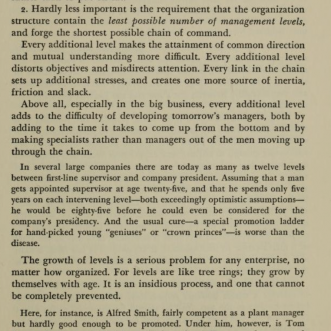
..and when the next step feels hairy,
…and when the next step feels hairy, it’s good to know there’s someone that has your back.

…and when the next step feels hairy, it’s good to know there’s someone that has your back.

I loved Seth Godin’s blog post yesterday.
In it he talks about the gap in customer service between one person in your team and another – or even between the same person on a good day and a bad day – and how you might address it.
One approach is to nail everything down so much that delivery of the experience is exactly the same, no matter who is giving it. Another is to leave it to a great person doing the job, giving them “room to shine. With all the variability that entails.”
“It’s almost impossible to have both.”
Almost, but not impossible.
Hire great people, give them a Promise of Value and a Customer Experience Score, that creates a floor, but no ceiling, then set them free to interpret it in their own way.
Variations on a theme. The best of both worlds.

When sending and receiving, asking and getting an answer, happens asynchronously, it takes more work to get to a point where things can move forward.
This work is often invisible until you try and capture it in a Customer Experience Score.
At which point, it’s a good idea to ask: “How much of this can I make synchronous instead?”
Over the last 10 years or so, we’ve got so used to tech that allows us to operate asynchronously that we default to it.
Now we have tech that makes it much easier to operate synchronously too – even across time-zones. Perhaps that should be our new default?

That was the question asked on ‘The Agenda with Steve Paikin’ the other day.
Of course it’s the wrong question.
One real question is “How do you build an organisation that takes individual competences and creates an organisational capability”. In other words, how do you co-ordinate the activities of different people into a consistent, repeatable business activity?
Another is “How do we create organisations that are as capable of as the people inside them?”. In other words, how do you make sure that individual capabilities are not stifled/wasted in the process?
If you want your business to achieve its purpose effectively and efficiently, you have to find a way of managing that addresses both of these questions.
Managers are a solution, but they aren’t the only one. And they may not be the best.

When I finally worked out what was going wrong with my website last week I was appalled.
It was a miracle I hadn’t felt the consequences much sooner. Only the fact that the internet is literally a world-wide web, full of redundancy and alternative routes had kept everything working for so long.
That’s because it’s an ecosystem, and in an ecosystem variation and redundancy is actually what keeps it stable over time.
A machine, in contrast, would have simply stopped long ago.
If something wasn’t quite right in your business, would you want it to carry on working, or would you prefer it to stop immediately?
If you want to make sure it carries on, you might want to build in some redundancy, and some tolerance for variation.

I’ve finally found a way to lose weight effortlessly – get more sleep.
Sadly for me, this isn’t an answer. I get a good 8 hours a night. And even that may not be natural. In the past, getting those eight hours took longer. People took two sleeps, with a gap between, where they might read, chat, sew, make love or even get up and do stuff.
Industry made that impossible for most people. For the past 500 years or so we’ve gradually compressed the opportunity for sleep into a smaller and smaller timeframe. Which is of course counter-productive. Well-slept people are mare productive, and less dangerous to themselves and others.
For all the emphasis on LEAN and reducing all forms of waste, Muri – wasted effort due to overburdening or stressing people, equipment or systems, is the one we consistently ignore.
One of the best ways to reduce it, is to increase the efficiency of our time at work. Automate drudgery, make sure people know what they are supposed to be doing and why, give them autonomy over how and where they do it.
The reward for the business is increased profit. A side-effect is more time for everyone – including you.

It’s long been assumed that people find it harder to compare between high-value options than between low-value ones. To put it concretely, we’re supposed to find it harder to compare a £350,000 house and a £355,000 house, than to compare a £90,000 house and a £95,000 one.
The idea is that although the size of the difference in value might be the same in both cases, as the proportion of the difference shrinks, comparison becomes harder.
It turns out this assumption is wrong. In a recent study, researchers found that not only are we more accurate in our selections, when more value is at stake, we can also be fast. And when we are given context – in other words, we know there’s a lot at stake – we consciously slow down to make our decision better.
This has some implications for pricing. You can’t take a ‘nobody will notice the extra £xxx’ attitude. People will expect to see higher value for a higher price, and they can tell the difference.
Perhaps more interesting are the implications for delegation. We’re smarter than we thought.
You can trust your people with bigger decisions than you might have assumed. Especially if you give them the context to make them in.

Humans keep most of their brain cells in their heads.
Which means that our bodies, sensing the world around us, have to send messages ‘up the line’ and wait for instructions before they can act. That’s an exaggeration of course, we have automatic reflexes. But on the whole, if I want to move my legs, my brain has to tell them to do it first.
Octopuses have a different model of intelligence. Most of their brain cells are in their tentacles. Which means that each tentacle has its own ‘brain’. Tentacles are autonomous, able to operate independently of the head-brain, and of each other, yet also connected. Tentacles can even have different ‘personalities’ – some are ‘shy’, some are ‘bold’, and so will react differently to the world around them- enriching the information collected and minimising risk to the organism as a whole.
You can probably see where I’m going with this. Over their 155 million years of evolution, octopuses have mastered the art of effective delegation. For them ‘The Boss’ has all but disappeared. 9 brains are better than one.
We could learn something from them.

Here’s Peter Drucker talking about management chains, way back in 1954:
“Every additional level makes the attainment of common direction and mutual understanding more difficult. Every additional level distorts objectives and misdirects attention. Every link in the chain sets up additional stresses and creates one more source of inertia, friction and slack. Above all, especially in the big business, every additional level adds to the difficulty of developing tomorrow’s managers, both by adding to the time it takes to come up from the bottom and by making specialists rather than managers out of the men moving up the chain.”
There’s a good chance that these observations reflect your reasons for setting up on your own – so you could focus on the customer rather than your boss(es), and so you could have complete autonomy over how you serve those customers.
But as you grow your own business from just you to more than a few, how do you stop yourself replicating the structures you found so constricting?
Simple.
Make everyone a manager – not of other people, but of the process every business runs – making and keeping promises to the people it serves:

When everyone’s a boss, there’s no need for chains of any kind.
Thanks to Michele Zanini for the prompt.

It feels nice to be wanted. To be the fount of all knowledge . To be the one everyone turns to when they have a question. To be deferred to in all day-to-day decision-making. To be the person every client or prospect enquiry is referred to.
But beware. Making yourself indispensable is the passive form of being a control freak. An indispensable boss may not actively seek to control what others do, and how they do it, but somehow nothing much happens without being run past them first. The approach is different, but the result is the same.
It isn’t productive. It isn’t very liberating for the people with day-to-day decisions to make. It can easily become a trap for you. And it soon becomes a constraint on the growth of your business.
The solution is to enable people to answer their own questions, make their own decisions. Not from scratch, but with all the benefit of what you already know. As a Customer Experience Composer, not the boss.
Write them a score. Let them rehearse their part before they have to perform in front of a live audience. Get everyone together for regular practice at playing together. Review the score. Adjust if necessary.
Free your team to bring more of themselves to the job, free yourself up to deal with everything that isn’t day-to-day, free your business up to fly.
The music in your head is the start, not the end. Get it out there.